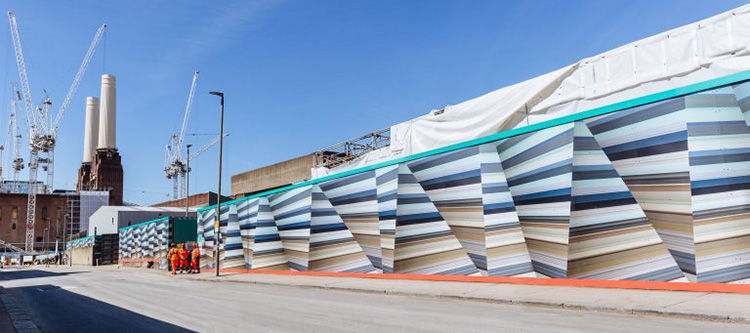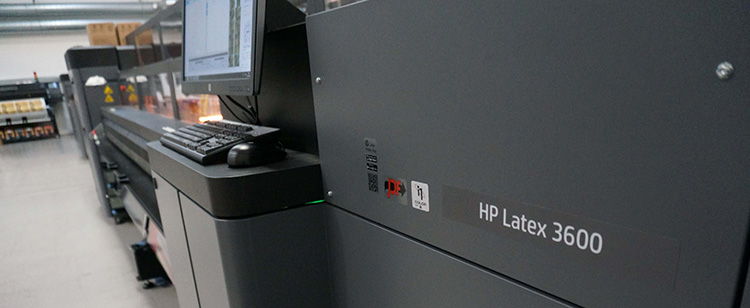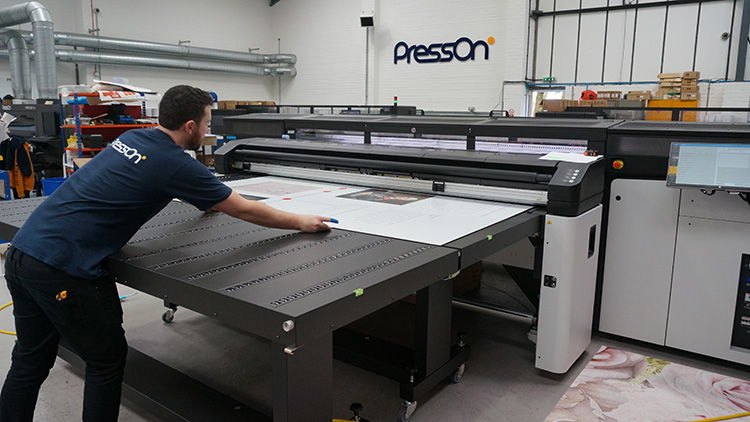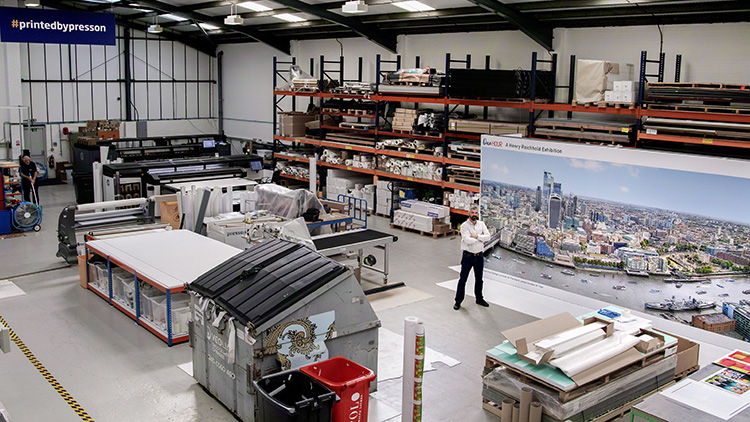PressOn was established in 2000, but it's not just its birth date that marks it out as a fully 21st century business. Based in Kent, the large format digital printing and installation company has won loyal customers across the UK, thanks to its ethos of evolution.
Two decades ago, Andy Wilson founded the company not on a bedrock of technical knowledge but on sales. One of his first jobs was selling newspaper adverts, experience that he then took to one of the UK's first wide format digital printing bureaux. In the fledgling digital print marketplace of the late 1990s, his role was to call advertising agencies to promote short-run billboard printing. "It didn't go very well in the beginning because when I told them the price they didn't believe we could do it for so much less than screen printing, so after a few months I had to put the price up to make it more credible," he laughs. He then spent five years 'dotting around the trade' before setting up his own digital print business, originally called PressOn Digital Imaging Ltd, aged 25.
But why did he start his own business, rather than stay with an established company? He explains: "The trade was starting to see that there were opportunities with large format digital printing, but they weren't taking it seriously. They saw it as a bolt-on to their existing screen and litho equipment and didn't see what it was capable of. Back then digital wasn't capable of much, but I could see that was the way it was going to go."
Armed with a few thousands of pounds' investment, a credit card and a spare bedroom in Whitstable, PressOn bought an electrostatic plotter and a couple of second-hand inkjet printers and started printing short-run billboards and point-of-sale.
"PressOn was built on Friday night phone calls from people who'd been let down by their current supplier," Andy says. "There was an element that I'd brought from the newspapers of going the extra mile for customers. The old guard of printing had more of a 'take it or leave it' approach, they had become overweight and lethargic, but we wanted to be younger, more agile, more flexible, more versatile. We've kept those ethics throughout the 20 years the business has been going."
"We also have a strong accountability ethic," he adds. "At first, we were dealing with professional print buyers and traffic departments, whereas now our customer profile is someone who doesn't know about print, doesn't know the terminology. It's our job to hold the customer's hand and create the end-product they want while taking the risk element out of the process"
When digital billboard printing became more commonplace, PressOn moved into retail, working directly with customers including Signet Group, Morgan, Virgin Cosmetics Company and Virgin Megastore. Thanks to the advent of digital, retailers with a handful of branches now had access to premium point-of-sale (POS) signage that would have previously required a national run. Next was trade signage, then fleet livery. More recently PressOn added hoardings and taxi wraps to its portfolio.

"Some of our competitors have failed because they've gone into marketplaces and stayed there, while we've never tried to focus on one area and that's helped us survive for so long," says Andy. "The business has always had to keep evolving as the technology becomes accessible to the customer."
PressOn's Xerox electrostatic plotter gave way to Océ Arizona solvent printers, which Andy describes as 'pretty revolutionary' thanks to the access this technology gave to the signage market. Then, in the mid-2000s, direct-to-substrate UV arrived, in the form of DuPont Chromaprint. "That enhanced what we could offer to the sign industry," he says. This was a period of innovation in the digital print world, with PressOn trialling a number of different technologies and systems, before starting to adopt HP Latex in around 2009.
"When we got our first HP Latex printer, that changed everything," says Andy. "A lot of our work was short-turnaround, high-demand work on self-adhesive vinyl, from customers who wanted it tomorrow, which is problematic with solvent printing. With Latex inks you don't have to gas off, you can go straight from print to installation. UV print doesn't work well with self-adhesive vinyl either because it makes it brittle and harder to remove at end of life. All the problems we were having suddenly went away when we switched to Latex ink."

HP Latex also helped ticked boxes for sustainability, both in terms of environmental responsibility and ensuring PressOn engages with new generations of customers going forward.
Andy explains: "Our focus at the moment is environmental impact. The printing industry has never been environmentally friendly – it uses a lot of energy and makes a lot of waste – but we're more than capable of asking questions about what we can do about it. We're looking at everything from energy recovery to closed-loop recycling.
"Our green ethos is coming from our customers and from our staff. It's a generational thing. Millennials and Generations Zs have different work ethics and social needs, and the environment is extremely high on their agenda. When I worked in a screen-printing factory my clothes would reek of the chemicals. Even UV printers can produce unpleasant smells. Our millennial staff want a better working environment than that, which is a big reason why we bought the HP Latex R-series. It doesn't need extraction, doesn't make any horrible smells, and doesn't produce massive amounts of heat.
"They also like the green credentials: the water-based inks, the cardboard packaging, the fact that it can go back to HP at the end of its life and be completely recycled. It ticks boxes for our millennial staff but also, importantly, translates to the millennial customer."
In spite of all this, PressOn was among the many businesses affected by COVID-19. Andy recalls: "By the end of March things had ground to a halt. April 2020 was the worst month in our 20-year history. But, a lot of the work that had been postponed was coming back at the end of June, so we're beginning to get some modicum of normality."
To get through this period, Andy says he relied on his network – other print business owners he has known for decades and can depend on to help paint an honest picture of the market.
"When you're sitting on your own in an office that's normally full of people, I found some comfort in reaching out to my peers and asking how they're finding it, and them in return asking how I'm doing. It's good to talk to someone in a similar boat."
It was a challenging time, but Andy is always looking ahead by remembering his beginnings in the industry. He concludes: "I don't want to be like that old guard I looked at when I was 25 years old and decided to set my own company up because I didn't agree with what they were doing."
You can find out more about PressOn and what they can do for you by visiting their website at https://www.presson.co.uk/






